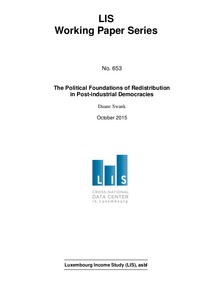The political foundations of redistribution in post-industrial democracies
"Fiscal redistribution by the state provides a powerful counterweight to the growth of market income inequality in post-industrial democracies. Yet, significant questions remain about what explains the substantial variation in redistribution across nations and time in the contemporary era. In a...
| Main Author: | |
|---|---|
| Institution: | ETUI-European Trade Union Institute |
| Format: | TEXT |
| Language: | English |
| Published: |
Luxembourg
2015
LIS |
| Subjects: | |
| Online Access: | https://www.labourline.org/KENTIKA-19109304124919275869-The-political-foundations-of-r.htm |
| _version_ | 1771659899559739392 |
|---|---|
| author | Swank, Duane |
| author_facet | Swank, Duane |
| collection | Library items |
| description | "Fiscal redistribution by the state provides a powerful counterweight to the growth of market income inequality in post-industrial democracies. Yet, significant questions remain about what explains the substantial variation in redistribution across nations and time in the contemporary era. In addition to recognizing the response of election-minded governments to the growth in insecurities and demands for redistribution associated with post-industrialization, I argue that where social democratic parties rule, and where employers and labor remain highly organized, inequality is blunted through redistribution of income by cash transfers and direct taxes and policies targeted at low income strata. This should be the case because the organizational scope, centralization, and policymaking integration of labor and capital facilitates the creation of post-industrial political coalitions necessary for redistributive policy making and implementation by social democratic governments, and organizationally suppresses insider politics by sectorally fragmented actors and excessive rent seeking by narrow interest groups. Labor organization, in particular, directly promotes demands for redistribution through several channels. I use 1979 to 2011 data from 18 democracies and estimate models of redistribution and policies for “outsiders.” The main argument is supported by the evidence: social democratic government has especially significant egalitarian impacts on unemployment benefits and minimum income supports for low income workers as well as active labor market policies at high levels of labor and employer organization. Labor organization, itself, has significant and substantively large effects on fiscal redistribution. I use these results and evidence on recent trends in key determinants of redistribution to reflect on whether an era of “permanent inequality” is inevitable or simply a political possibility." |
| format | TEXT |
| geographic | developed countries |
| id | 19109304124919275869_96b65d3d68474159ab8eea06076388a0 |
| institution | ETUI-European Trade Union Institute |
| is_hierarchy_id | 19109304124919275869_96b65d3d68474159ab8eea06076388a0 |
| is_hierarchy_title | The political foundations of redistribution in post-industrial democracies |
| language | English |
| physical | 67 p. Digital |
| publishDate | 2015 |
| publisher | Luxembourg LIS |
| spellingShingle | Swank, Duane government policy guaranteed income income redistribution unemployment work organization The political foundations of redistribution in post-industrial democracies |
| thumbnail | https://www.labourline.org/Image_prev.jpg?Archive=107693592587 |
| title | The political foundations of redistribution in post-industrial democracies |
| topic | government policy guaranteed income income redistribution unemployment work organization |
| url | https://www.labourline.org/KENTIKA-19109304124919275869-The-political-foundations-of-r.htm |

